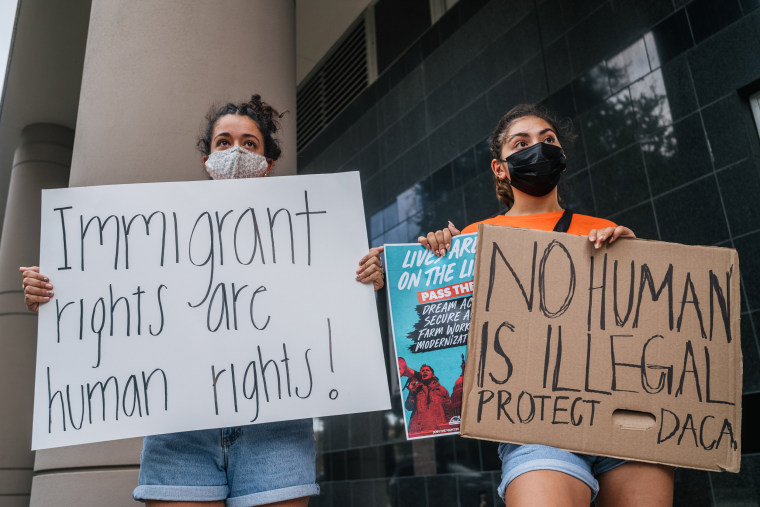A federal appeals court granted a temporary reprieve Wednesday to hundreds of thousands of young immigrants enrolled in a program allowing them to work and study in the U.S. without fear of being deported, but it’s unclear how long it will last.
The ruling by the 5th U.S. Circuit Court of Appeals directs the lower court judge who found that the decade-old Deferred Action for Childhood Arrivals program was unlawful to take into consideration a new rule issued by the Biden administration. It allows the program to go forward, but only for current DACA recipients known as Dreamers, not new applicants.
The rule review could preserve DACA for at least several more months, but its future is far from assured, especially given the current, more conservative composition of the Supreme Court.
A Justice Department spokesperson said in a statement that the agency “respectfully disagrees with the decision and will continue to vigorously defend the lawfulness of DACA as this case proceeds.”
The Biden administration has been preparing contingencies in case the courts shut the program down. People close to the White House have told NBC News that President Joe Biden was readying an executive order directing Immigration and Customs Enforcement to deprioritize the removal of DACA recipients and refrain from deporting them if they aren’t deemed threats to public safety or national security. That action, however, is temporary, and it could be undone by another president.
In August, the administration also announced a new rule, set to go in effect Oct. 31, to codify DACA and address some of the concerns the Supreme Court has voiced about the program. The rule is what the appeals court directed a federal judge in Texas to review.
Rep. Raul Ruiz, D-Calif., the head of the Congressional Hispanic Caucus, said in a statement Wednesday that DACA recipients could “breathe a sigh of relief,” but he added that “the urgency remains to pass a permanent solution that brings stability to the lives of DACA recipients.”
President Barack Obama established DACA by executive order in 2012 out of frustration over congressional inaction on immigration reform. The program established a way for young migrants brought into the U.S. as children, who are often referred to as Dreamers based on never-passed legislation in Congress called the DREAM Act, to study and work without fear of being deported.
But President Donald Trump, who had at times hailed such young people despite campaign promises to crack down on illegal immigration, announced in September 2017 that he was ending the program, and he called for a permanent version of the program as part of a “comprehensive” immigration overhaul. “Congress, get ready to do your job — DACA!” he tweeted.
Congress failed to reach a deal, and advocates of the program sued to block its termination.
In June 2020, the Supreme Court found in the advocates’ favor in a 5-4 ruling. The swing vote, Chief Justice John Roberts, sided with the liberal justices, finding that the Trump administration had broken the laws governing federal agencies when he ended DACA in 2017 because the memorandum that recommended terminating it didn’t address crucial parts of the policy. Roberts pointed out toward the end of his opinion that the DHS could simply revisit its legal strategy on how to unwind DACA in the future.
Meanwhile, Texas, which is home to over 100,000 people enlisted in the DACA program, pressed ahead with a lawsuit it filed in 2018, with the backing of other Republican-led states, alleging that the program is illegal. Texas also alleged that the program is harmful because it enables DACA recipients to compete with citizens for jobs and that it leaves the state on the hook for some health care, education and social services costs.
Immigration advocates countered that the states didn’t provide enough evidence about what those costs are and that the states would have to pay them regardless. The states also failed to account for how “DACA recipients residing in the states outweigh the added revenue the states receive from their taxes and their contributions to the public (including through their work as healthcare professions, educators, and in other service jobs),” the advocates’ filing said.
In his July 2021 ruling, U.S. District Judge Andrew Hanen of Houston sided with the states, finding that DHS didn’t have the authority to implement DACA and that the program was unlawful. He stayed parts of his decision pending appeal, allowing DHS to process DACA renewal applications but barring the approval of new applicants.
Hanen noted in his ruling that the DACA recipients had engendered public sympathy.
“Many came to this country unlawfully or stayed in this country without permission through no fault of their own,” he wrote. “Further, according to many of the amicus briefs, the DACA population is generally well-educated and better situated to contribute to the well-being of this nation than other immigrant populations. As a group they are law-abiding and hold responsible positions, despite their youth. These factors make the DACA population a much more appealing and sympathetic group. While these may be compelling policy rationales for DACA, they can have no effect on this court’s legal conclusion.”
“As popular as this program might be, the proper origination point for the DACA program was, and is, Congress,” Hanen added.
After the appeals court ruling, advocates like Sergio Gonzales urged Congress to take immediate action.
“With the direction of the courts clear, options for executive action limited, and a change in the composition of Congress possible, we want to be crystal clear: the only realistic way to protect the 610,000 young people with DACA is for Congress to act by the end of the year," Gonzales, the executive director of the Immigration Hub, said in a statement.
"Any common sense Republicans left in Congress should return to the pragmatism of past GOP leaders like John McCain and do what is in the best interest of the country," he said.


